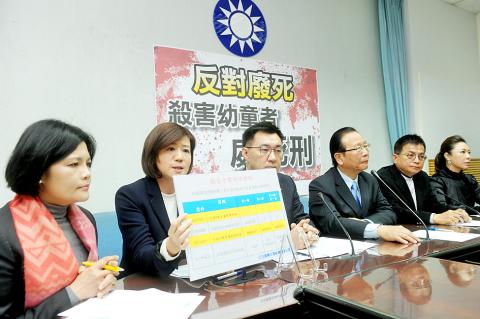The Chinese Nationalist Party (KMT) caucus yesterday called on president-elect Tsai Ing-wen (蔡英文) to explain her stance on the abolition of the death penalty, saying it does not rule out subjecting the controversial issue to a referendum.
The KMT caucus made the remarks during a news conference at the legislature, amid public fury over the brutal murder of a four-year-old girl, who was decapitated in front of her mother in an apparent random attack in Taipei’s Neihu District (內湖) on Monday.
The girl’s death has renewed debate on the abrogation of capital punishment, which still exists in Taiwan. The last time a convict was put to death in the nation was in June last year, when six death-row inmates were executed.

Photo: CNA
“We strongly oppose scrapping the death penalty. A murderer must pay the price for his crime with his own life,” KMT deputy caucus whip Lin Te-fu (林德福) told the news conference.
Lin said the tragedy is heart-wrenching and that the caucus held the news conference to ask opponents of the death penalty: “Do you think society can accept your proposal?”
KMT caucus whip Lai Shyh-bao (賴士葆) called on the Ministry of Justice to execute the 42 death-row inmates in the nation’s prisons as soon as possible to deter similar atrocities.
“The ministry has sought to put off the executions by citing two UN human rights conventions,” Lai said, referring to the International Covenant on Civil and Political Rights and the International Covenant on Economic, Social and Cultural Rights ratified by President Ma Ying-jeou (馬英九) in May 2009.
Given increasing public calls for the abolition of the death penalty and many DPP members’ opposition to capital punishment, the ministry might become even less willing to carry out a death sentence once the new DPP administration is sworn in on May 20, Lai said.
Most murderers targeting young children in the past few years have not been put on death row because of the two UN conventions and the convicts’ claims of mental disorders, KMT Legislator Johnny Chiang (江啟臣) said.
“Should our future head of state insist on pushing for the abrogation of capital punishment, we do not rule out initiating a referendum to let the public decide,” Chiang said, urging judges to mete out the most severe sentence for child killers.
KMT Legislator Alicia Wang (王育敏) said a draft amendment she has proposed to the Criminal Code to subject people who kill children under the age of 12 to a mandatory death sentence or life sentence is set to be deliberated during a legislative committee meeting tomorrow.
Separately yesterday, Premier Simon Chang (張善政) said that society is still far from reaching a consensus on the abrogation of capital punishment.
“The death penalty still exists in the nation, though some people really want to see it gone. It requires a high level of public consensus to amend current laws,” Chang said after visiting people injured in the Formosa Fun Coast water park disaster in New Taipei City’s Bali District (八里) in June last year.
Chang said as a government official, he is not in a position to comment on the issue.
“We should leave this matter to the public to decide,” he said.

People can preregister to receive their NT$10,000 (US$325) cash distributed from the central government on Nov. 5 after President William Lai (賴清德) yesterday signed the Special Budget for Strengthening Economic, Social and National Security Resilience, the Executive Yuan told a news conference last night. The special budget, passed by the Legislative Yuan on Friday last week with a cash handout budget of NT$236 billion, was officially submitted to the Executive Yuan and the Presidential Office yesterday afternoon. People can register through the official Web site at https://10000.gov.tw to have the funds deposited into their bank accounts, withdraw the funds at automated teller

PEACE AND STABILITY: Maintaining the cross-strait ‘status quo’ has long been the government’s position, the Ministry of Foreign Affairs said Taiwan is committed to maintaining the cross-strait “status quo” and seeks no escalation of tensions, the Ministry of Foreign Affairs (MOFA) said yesterday, rebutting a Time magazine opinion piece that described President William Lai (賴清德) as a “reckless leader.” The article, titled “The US Must Beware of Taiwan’s Reckless Leader,” was written by Lyle Goldstein, director of the Asia Program at the Washington-based Defense Priorities think tank. Goldstein wrote that Taiwan is “the world’s most dangerous flashpoint” amid ongoing conflicts in the Middle East and Russia’s invasion of Ukraine. He said that the situation in the Taiwan Strait has become less stable

REASSURANCE: The US said Taiwan’s interests would not be harmed during the talk and that it remains steadfast in its support for the nation, the foreign minister said US President Donald Trump on Friday said he would bring up Taiwan with Chinese President Xi Jinping (習近平) during a meeting on the sidelines of the APEC Summit in South Korea this week. “I will be talking about Taiwan [with Xi],” Trump told reporters before he departed for his trip to Asia, adding that he had “a lot of respect for Taiwan.” “We have a lot to talk about with President Xi, and he has a lot to talk about with us. I think we’ll have a good meeting,” Trump said. Taiwan has long been a contentious issue between the US and China.

Japanese Prime Minister Sanae Takaichi yesterday lavished US President Donald Trump with praise and vows of a “golden age” of ties on his visit to Tokyo, before inking a deal with Washington aimed at securing critical minerals. Takaichi — Japan’s first female prime minister — pulled out all the stops for Trump in her opening test on the international stage and even announced that she would nominate him for a Nobel Peace Prize, the White House said. Trump has become increasingly focused on the Nobel since his return to power in January and claims to have ended several conflicts around the world,